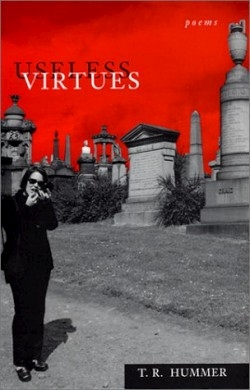
Useless Virtues
Poems
Is it possible that a poet writes in order to perplex a reader? To ask questions, or tell stories, without necessarily sorting it out for him or herself? It seems that this author operates, at least in part, with these tensions bubbling near the surface of so many of these newest poems.
“The dream of the Cambodian boy on a red eye flight to Dallas” interweaves Baseball, temple bells, roadkill, cemeteries, bread, sexual ambiguity, and a poster of Pol Pot nailed to the wall of a compound, monsoon-faded, laced by bullet holes.
These few lines are from the title poem, which appears at the beginning of the book. It is a poem of suggested images and unanswered questions, weaving both specificity (by way of descriptive language) and obliqueness into an indefinable mélange. Throughout the book, Hummer, who is the author of six previous collections, including Walt Whitman in Hell and The 18,000-Ton Olympic Dream, displays a particular flair for using polysyllabic words (i.e., “incommensurability” and “transubstantiation”) as well as words not often found in everyday speech, much less everyday poems, like “catachresis”).
This would all be quite admirable, except that at times the poet’s intricate philosophies and experiences, and their manifestation in language, seem a private affair. The tone seems removed and even vaguely disdainful. Most poets want their poems to be understood, and of course the reader should have to work, but these poems move in and out of certainty, as if this were still undecided territory:
I prepare
A simple pot roast, I scrub the toilet clean.
Friends come by for dinner, stepchildren
Of clarity, hunted down by the obscure.
By midnight, I am almost asleep, almost ready
To dream again of our common disaster?
More disjuncture reveals itself in a poem titled “Erotica,” which is not your usual foray into the realm of sensuality and pull: “and the luminist moon / uncovers the shocking, beautiful, curve / of a forklift’s roll bar-somehow, yes, even here.” And so the reader must go boldly forth, sometimes marvelling, other times at a loss for understanding.
Disclosure: This article is not an endorsement, but a review. The publisher of this book provided free copies of the book to have their book reviewed by a professional reviewer. No fee was paid by the publisher for this review. Foreword Reviews only recommends books that we love. Foreword Magazine, Inc. is disclosing this in accordance with the Federal Trade Commission’s 16 CFR, Part 255.
